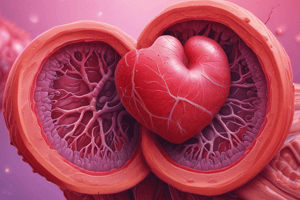Podcast
Questions and Answers
What is the primary cause of coronary artery disease?
What is the primary cause of coronary artery disease?
- Excessive physical activity
- Environmental factors
- Genetic predisposition
- Blockage of arteries due to atherosclerosis and arteriosclerosis (correct)
Which condition is characterized by the hardening of the arteries?
Which condition is characterized by the hardening of the arteries?
- Angina pectoris
- Myocardial infarction
- Aneurysm
- Arteriosclerosis (correct)
What is often the indirect result of arterial atherosclerosis?
What is often the indirect result of arterial atherosclerosis?
- Angina pectoris
- Myocardial infarction
- Malnutrition (correct)
- Heart failure
Which of the following symptoms is primarily caused by myocardial ischemia?
Which of the following symptoms is primarily caused by myocardial ischemia?
Which of the following is a key modifiable risk factor for coronary artery disease?
Which of the following is a key modifiable risk factor for coronary artery disease?
What is a common surgical management approach for coronary artery disease?
What is a common surgical management approach for coronary artery disease?
Which exercise is recommended for improving arterial circulation?
Which exercise is recommended for improving arterial circulation?
Which dietary practice is advised for managing coronary artery disease?
Which dietary practice is advised for managing coronary artery disease?
What is the leading cause of death in Canada related to cardiovascular health?
What is the leading cause of death in Canada related to cardiovascular health?
What effect do stress reduction techniques have on arterial health?
What effect do stress reduction techniques have on arterial health?
Flashcards are hidden until you start studying
Study Notes
Coronary Artery Disease (CAD)
- Most common form of heart disease.
- Occurs when arteries in the heart are blocked, leading to complications including angina, myocardial infarction (MI).
- Blockage caused by atherosclerosis and arteriosclerosis.
Atherosclerosis vs. Arteriosclerosis
- Arteriosclerosis: Hardening of the arteries. Muscles fibers and endothelial lining of walls of small arteries and arterioles become thickened.
- Atherosclerosis: Involves large and medium-sized arteries. Accumulation of lipids, calcium, and blood components on the intimal layer of the artery.
- Both are usually present in the body.
Coronary Atherosclerosis
- Abnormal accumulation of lipid deposits and fibrous tissue within arterial walls and lumen.
- Blockages and narrowing of the coronary vessels reduce blood flow to the myocardium.
Clinical Manifestations
- Symptoms are caused by myocardial ischemia.
- Symptoms and complications are related to the location and degree of vessel obstruction.
- Angina pectoris: Chest pain due to myocardial ischemia.
- Myocardial infarction: Heart attack.
- Heart failure: Condition where the heart cannot pump blood effectively.
- Sudden cardiac death: Unexpected death from a cardiac event.
Risk Factors
- Four modifiable risk factors:
- Cholesterol abnormalities
- Tobacco use
- Hypertension
- Diabetes mellitus
- Metabolic syndrome: Combination of risk factors that increase the risk of heart disease, stroke, and type 2 diabetes.
Improving Arterial Circulation
- Exercises and activities: Walking, graded isometric exercises. Consult a healthcare professional before prescribing an exercise routine.
- Temperature: Effects of heat and cold can impact blood flow.
- Smoking cessation: Smoking damages blood vessels and increases the risk of heart disease.
- Stress reduction: Stress can raise blood pressure and increase the risk of heart disease.
- Good nutrition, low-fat diet: A healthy diet can help lower cholesterol levels and improve blood flow.
- Weight reduction as necessary: Obesity is a major risk factor for heart disease.
Medical Management
- Prevention: Lifestyle modifications, medication, and surgery can help prevent heart disease.
- Exercise program: Regular exercise can improve cardiovascular health.
- Medications:
- Pentoxifylline (Trental) and cilostazol (Pletal): Improve blood flow to the legs and feet.
- Antiplatelet agents: Prevent blood clots.
- Surgical management: Procedures like angioplasty and bypass surgery can open blocked arteries.
Indirect Results of Arterial Atherosclerosis
- Malnutrition: Due to reduced blood flow to organs.
- Fibrosis: Scarring of organs due to lack of oxygen and nutrients.
- Aneurysm: Bulging or weakening of an artery.
- Ulceration: Open sores in the lining of an artery.
- Stenosis of lumen: Narrowing of the artery's opening.
Studying That Suits You
Use AI to generate personalized quizzes and flashcards to suit your learning preferences.




